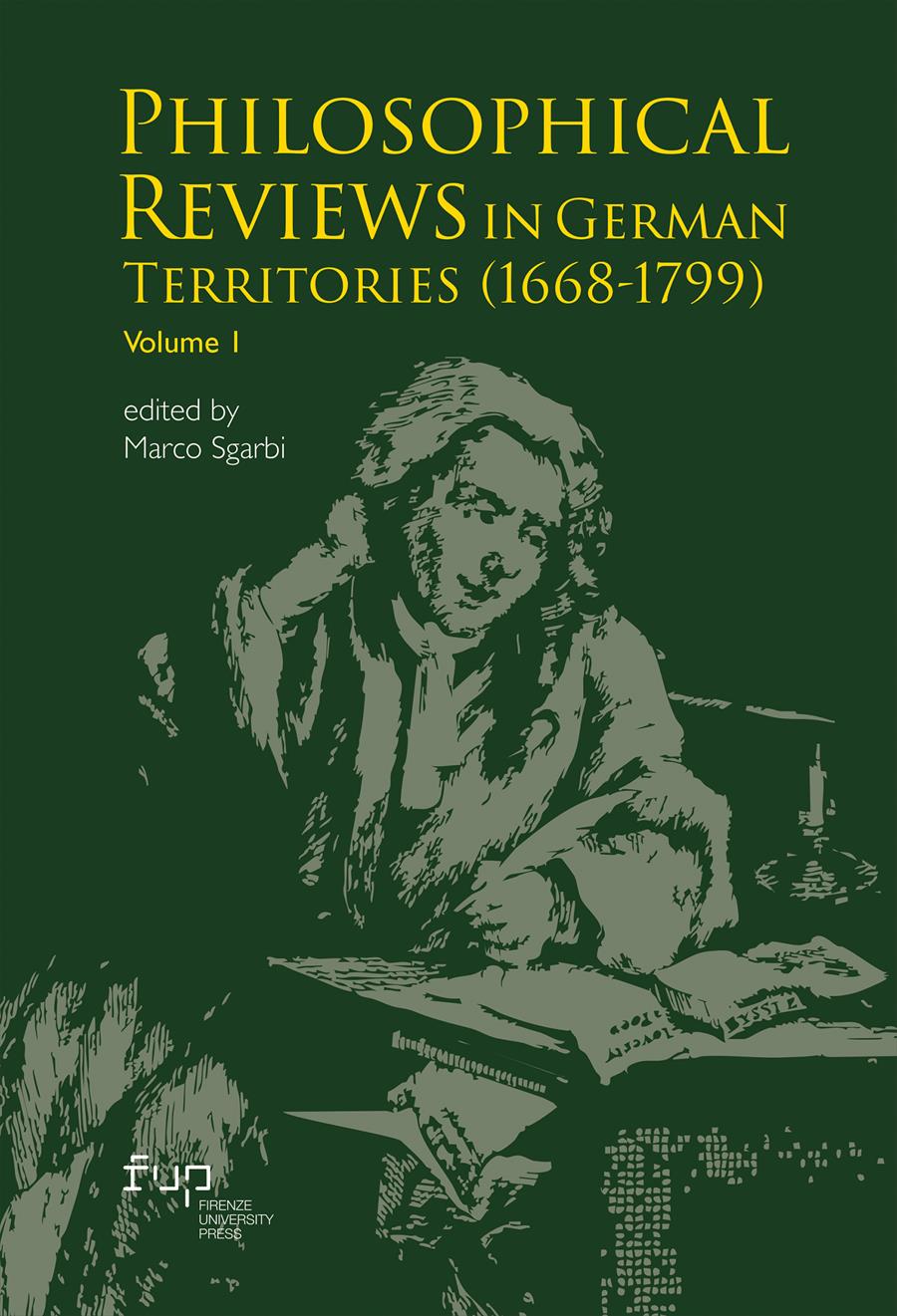- Philosophical Reviews in German Territories (1668-1799)
- Edited by Marco Sgarbi
Christoph Pfautz as a Reviewer for the Acta Eruditorum: the Invention of a German Tradition in the Sciences
- Mattia Brancato
- © 2025 Author(s) |
- CC BY 4.0
- DOI: 10.36253/979-12-215-0573-3.02
In 1682, Otto Mencke and Christoph Pfautz founded the Acta Eruditorum, the first fully-fledged German scientific journal. In this paper, I argue that this journal had a fundamental role in shaping the narrative on the rise of the new science in the 17th century, placing Germany as the ideal intermediary between tradition and innovation. In particular, Pfautz’s review of Newton’s Principia in the Acta Eruditorum initiated the Leibniz-Newton controversy, which forced the German tradition to reconsider its role and reshape its philosophical foundations to appeal to a wider international audience.
- Keywords:
- Pfautz,
- Leibniz,
- Newton,
- reviews.,
Ca' Foscari University of Venice, Italy - ORCID: 0000-0002-2325-8077
- Ahnert, Thomas. 2004. “Newtonianism in early Enlightenment Germany, c. 1720 to 1750: metaphysics and the critique of dogmatic philosophy.” Studies in History and Philosophy of Science Part A, 35-3: 471-491.
- Ango, Pierre. 1682. L’Optique. Paris: Estienne Michallet.
- Antognazza, Maria Rosa. 2009. Leibniz. An Intellectual Biography. New York: Cambridge University Press.
- Appaetecchi, Elisabetta. 2023. “Riformare il tempo. Una questione privata di Francesco Bianchini.” In Letteratura e Potere/Poteri Atti del XXIV Congresso dell’ADI (Associazione degli Italianisti) Catania, 23-25 settembre 2021. Roma: Adi editore.
- Baker, Thomas. 1684. Clavis geometrica catholica. London: Playford.
- Bardi, Jason. 2006. The Calculus Wars: Newton, Leibniz and the Greatest Mathematical Clash of All Time. London: High Stakes.
- Blondel, François. 1684. Histoire de Calendrier Romain, Qui contient son origine & les divers changemens qui lui sont arrivez. The Hague: Arnout Leers.
- Boulliau, Ismael. 1682. Opus novum ad arithmeticam infinitorum. Paris: Lutetiae Parisiorum.
- Habermann, K., Herbst, K. (ed.). 2016. Erhard Weigel (1625-1699) und seine Schüler. Beiträge des 7. Erhard-Weigel-Kolloquiums 2014. Göttingen: Universitätsverlag Göttingen.
- Cavina, Pietro Maria. 1681. Cometa anni 1680 et 1681 et in eundem astronomici conatus atque physicae meditationes. Faenza: Giorgio Andrea Zarafagli.
- Hevelius, Johannes. 1685. Annus Climactericus. Gdańsk.
- Huygens, Christiaan. 1684. Astroscopia compendiaria: tubi optici molimine liberata. Apud Arnoldum Leers.
- Huygens, Christiaan. 1891. Oeuvres completes de Christiaan Huygens. The Hague: Publiées par la Société Hollandaise des Sciences.
- Iltis, Carolyn. 1971. “Leibniz and the Vis Viva Controversy.” Isis 62-1: 21-35.
- Kracht, Manfred, Kreyszig, Erwin. 1990. “E. W. von Tschirnhaus: His role in early calculus and his work and impact on Algebra.” Historia Mathematica 17-1: 16-35.
- Laeven A.H., Laeven-Aretz, L.J.M. 2014. The authors and reviewers of the Acta Eruditorum 1682 - 1735. The Netherlands: Molenhoek.
- Laeven A.H., Laeven-Aretz, L.J.M. 1990. The 'Acta Eruditorum' under the editorship of Otto Mencke (1644-1707): the history of an international learned journal between 1682 and 1707. Amsterdam: APA - Holland University Press.
- Lach, Donald F. 1953. “The Sinophilism of Christian Wolff (1679–1754).” Journal of the History of Ideas 14: 561–574.
- Launay, Gilles de. 1681. La cosmographie aisée, contenant la sphère, l'usage du globe terrestre, et la Géographie. Paris: Michallet.
- Leibniz, G. W. 1923-. Sämtliche Schriften und Briefe. Darmstadt, Leipzig, Berlin: Akademie der Wissenschaften zu Berlin.
- Maitre, Marie-Julie. 2020. L’analogie de Joachim Bouvet entre le Xiantiantu de Shao Yong et l’arithmétique binaire de Leibniz. Analyse d’une rencontre intellectuelle transculturelle. New Taipei City: Sili danjiang daxue faguoyu wenxue xi.
- Moore, Jonas. 1681. A New System of the Mathematicks. London: Godbid and Playford.
- Newton, Isaac. 1687. Philosophiae naturalis principia mathematica. London: Streater.
- Pfautz, Christoph. 1682-1688. Acta Eruditorum. Leipzig: Gunther.
- Probst, Siegmund. 2018. “The Relation Between Leibniz and Wallis: An Overview From New Sources and Studies.” Quaderns d’Història de l’Enginyeria 16: 189-208.
- Ptolemy. 1682. Claudii Ptolemaeii harmonicorum libri tres. Oxford: E Theatro Sheldoniano,
- Rabouin, David. 2022. “Can one be a fictionalist and a platonist at the same time? Lessons from Leibniz.” Noesis 38: 161-194.
- Roinila, M. 2009. “G.W. Leibniz and Scientific Societies.” International Journal of Technology Management 46-1: 165-179.
- Schmidt, Robert W. 2022. “The Improved Calendar of 1700 and the Interplay with Astronomical Data - Der Verbesserte Kalender Des Jahres 1700 Und Das Wechselspiel Mit Astronomischen Daten.” Studia Leibnitiana, 54-1: 96–116.
- Sturm, Johann Christoph. 1681. Cometarum natura, motus et origo. Altdorf : Schönnerstaedt.
- Tachard, Guy. 1686. Voyage de Siam des Pères Jésuites envoyez par le Roy aux Indes & à la Chine. Paris.
- Szanser, A. J. 1976. “Johannes Hevelius (1611-1687)-Astronomer of Polish Kings.” Quarterly Journal of the Royal Astronomical Society 17: 488-498.
Chapter Information
Chapter Title
Christoph Pfautz as a Reviewer for the Acta Eruditorum: the Invention of a German Tradition in the Sciences
Authors
Mattia Brancato
Language
English
DOI
10.36253/979-12-215-0573-3.02
Peer Reviewed
Publication Year
2025
Copyright Information
© 2025 Author(s)
Content License
Metadata License
Bibliographic Information
Book Title
Philosophical Reviews in German Territories (1668-1799)
Book Subtitle
Volume 1
Editors
Marco Sgarbi
Peer Reviewed
Number of Pages
162
Publication Year
2025
Copyright Information
© 2025 Author(s)
Content License
Metadata License
Publisher Name
Firenze University Press
DOI
10.36253/979-12-215-0573-3
ISBN Print
979-12-215-0572-6
eISBN (pdf)
979-12-215-0573-3
eISBN (epub)
979-12-215-0574-0
Series Title
Knowledge and its Histories
